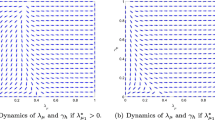Abstract
This article will argue that the state must learn to pursue productivity enhancing rather than predatory policies if rapid long-run development is to occur in poor countries. These productivity enhancing strategies will most likely involve investment coordination. However, such coordination of investment in manufacturing is likely to fail in less developed countries as a result of low productivity in the traditional, agricultural sector. More importantly, investment coordination in agriculture is more likely to be successful especially if this is a broad based investment strategy involving the bulk of the population. In this context, the state will learn effective policies for coordinating development. Alternatively, if the agricultural sector is ignored and productivity here remains low, investment coordination in manufacturing will likely fail, and the state will learn to become a predator.
Similar content being viewed by others
References
ADELMAN, IRMA 1984 Beyond export led growth.World Development 12 (September): 49–80.
AMSDEN, ALICE 1992 A theory of government intervention in late industrialization. InState and market in development: synergy or rivalry, edited by Louis Putterman and Dietrich Rueschemayer. Boulder, Co.: Lynne Rienner.
ANDERSON, KYM 1983 Growth of agricultural protection in East Asia.Food Policy 8 (November): 327–336.
ARROW, KENNETH 1962 The economic implications of learning by doing.Review of Economic Studies 29 (June): 155–173.
BARRO, ROBERT J. and XAVIER SALA-I-MARTIN 1995Economic growth. New York: McGraw-Hill.
BATES, ROBERT H. 1988a Governments and agricultural markets in Africa. InToward a political economy of development, edited by Robert H. Bates. Berkeley: University of California Press.
— 1988b Lessons from history, or the perfidy of English exceptionalism and the significance of historical France.World Politics 60 (July): 499–516.
BATES, ROBERT H. AND WILLIAM P. ROGERSON 1980 Agriculture in development: a coalitional analysis.Public Choice 35 (5): 513–1964.
FEI, J.C. AND G. RANIS 1964Development of the labor surplus economy: Theory and practice. Homewood, IL: Irwin.
HWA, ERH-CHENG 1988 The contribution of agriculture to economic growth: Some empirical evidence.World Development 16 (November): 1329–1339.
JOHNSTON, B.F. AND J.W. MELLOR 1961 The role of agriculture in economic development.American Economic Review 51 (September): 566–593.
JONES, E.L. 1977 Environment, agriculture, and industrialization in Europe.Agricultural History 51 (July): 491–502.
KREPS, DAVID 1990 Corporate culture. InPerspectives on positive political economy, edited by Kenneth Shepsle and James Alt. New York: Cambridge University Press.
KURER, OSKAR 1996 The political foundations of economic development policies.Journal of Development Studies 32 (June): 645–668.
LARDY, NICHOLAS R. 1984 Prices, markets, and the chinese peasant. InAgricultural development in the Third World, edited by Carl Eicher and John Staatz. Baltimore: Johns Hopkins University Press.
LEWIS, W.A. 1954 Economic development with unlimited supplies of labor.The Manchester School of Social and Economic Studies 22 (May): 139–191.
LIPTON, MICHAEL 1977Why poor people stay poor. Cambridge, MA: Harvard University Press.
MacFARLANE, ALAN 1997 ‘Japan’ in an English mirror.Modern Asian Studies 31 (October): 763–806.
MARTINOLA, GABRIELLA YINGYI QIAN AND BARRY WEINGAST 1995 Federalism Chinese style: The political basis for economic success in China.World Politics 48 (October): 50–81.
MUNDLE, S. 1985 The agrarian barriers to industrial growth.Journal of Development Studies 22 (October): 49–80.
MYINT, HLA 1975 Agriculture and economic development in an open economy. InAgriculture in development theory, edited by Lloyd G. Reynolds. New Haven, CT: Yale University Press.
NELSON, RICHARD 1956 A theory of the low-level equilibrium trap in underdeveloped countries.American Economic Review 46 (December): 894–902.
NORTH, DOUGLASS 1990Institutions, institutional change and economic performance. Cambridge: Cambridge University Press.
NORTH, DOUGLASS AND BARRY WEINGAST 1989 Constitutions and commitment: the evolution of institutions governing public choice in 17th century England. Political Economics Working Paper, Washington University (January).
OI, JEAN 1993 Reform and urban bias in China. InBeyond rural bias, edited by Ashutosh Varshncy. London: Frank Cass and Co.
OLSON, MANCUR 1982The rise and decline of nations: Economic growth, stagflation, and social rigidities. New Haven: Yale University Press.
QIAN, YINGYI AND BARRY WEINGAST 1995 Institutions, state activism, and economic development: a comparison of state-owned vs. town ship-village enterprises in China, mimeograph (May).
RODRÍGUEZ-CLARE, ANDRÉS 1996 The division of labor and economic development.Journal of Development Economics 49 (April): 3–32.
RODRIK, DANI 1996 Coordination failures and government policy: A model with applications to East Asia and Eastern Europe.Journal of International Economics 40 (February): 1–22.
SHESHINSKI, E. 1967 Tests of the “learning by doing.”Review of Economics and Statistics XLIX (November): 568–578.
SMITH, T.C. 1988Native sources of Japanese industrialization: 1750–1920. Berkeley: University of California Press.
TIMMER, C.P. 1992 Agriculture and economic development revisited.Agricultural Systems 40: 21–58.
— 1993Why markets and politics undervalue the role of agriculture in economic development, Benjamin H. Hibbard Memorial Lecture Series. Madison, WI: Department of Agricultural Economics.
— 1995 Getting agriculture moving: do markets provide the right signals?Food Policy 20 (October): 455–472.
VLASTOS, S. 1986Peasant protests and uprisings in Tokugawa, Japan. Berkeley: University of California Press.
WEINGAST, BARRY 1995a The economic role of political institutions: market preserving federalism and economic development.Journal of Law, Economics, and Organization 11 (April): 1–31.
— 1995b, A rational perspective on the role of ideas: shared belief systems and state sovereignty in international cooperation.Politics and Society 23 (December): 449–464.
WOLF, CHARLES JR. 1993Markets or governments: choosing between imperfect alternatives. Cambridge, MA: The MIT Press.
ZHOU, KATE XIAO AND LYN T. WHITE, III 1995 Quiet politics and rural enterprise reform in China.Journal of Developing Areas 29 (July): 461–489.
Author information
Authors and Affiliations
Additional information
Richard Grabowski is professor of economics at Southern Illinois University-Carbondale
Rights and permissions
About this article
Cite this article
Grabowski, R. Learning, multiple equilibria, and the state: Agriculture’s role. St Comp Int Dev 33, 46–69 (1998). https://doi.org/10.1007/BF02687491
Issue Date:
DOI: https://doi.org/10.1007/BF02687491




